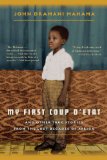Reading Guide Questions

Please be aware that this discussion guide will contain spoilers!
- Mahama dedicates My First Coup d'Etat "to the memory of my father, Mr. E. A. Mahama, a man of humility and integrity, who lived in service of his family, his people, and his nation." Give some examples of the elder Mahama's "humility and integrity." How did he impart these qualities to his nineteen children?
- Mahama writes, "A number of us who stayed during the 'lost decades' and lived through the difficulties, whether by choice or force, discovered that it was, ironically, during this time that we found ourselves, our voices." How did the hardships of the "lost decades" shape Mahama's personality, politics, and sensibility?
- As a seven-year-old student, the phrase "coup d'etat" was intriguing to Mahama, "like a game that all the upper-form students would soon be playing; and from the moment I first heard it—coup d'etat—I wished I could learn how to play this new game as well." Discuss how the coup appears through young Mahama's eyes. What does he fail to understand about the coup, and what does he sense about its dangers?
- "'Life is like a cycle,' Dad used to tell us. 'Everything goes around and comes around again. One day you're up, but the next day you might be down." Consider how these wise words apply to the Mahama family. When does the family enjoy its greatest prosperity? When does the cycle leave them struggling?
- Revisit the story of the district commissioner who insisted that Mahama's father, as a young village boy, attend a faraway school. What were the advantages and the costs of the elder Mahama's education? What was the impact on his family and community? In what ways did Mahama's own education parallel his father's?
- Mahama wondered after he stood up to Boafo, the bully of his school, "Why hadn't I seen before that our strength, our key to victory, was in our numbers, our unity?" Name other scenes in the memoir that prove this lesson of victory through solidarity. How does this theme of cooperation apply to Africa as a whole?
- According to Mahama, "I believe that little children view difference as a motivation to be more inclusive, though as we grow older and become adults we begin to see it as the opposite, a reason to exclude." Discuss how this theory of inclusion and exclusion applies to Ghana and its neighboring countries during the "lost decades" of Africa.
- The chapter "Full Moon Dance" opens, "The year our driver, Mallam, went mad is the same year I saw ice blocks falling from the sky and discovered that the recipe for love is a full moon and a good conductay." What adventures and discoveries does this sentence foreshadow for young Mahama?
- Consider Mahama's descriptions of village life in the North of Ghana. What makes Northerners different from the population of Southern Ghana? Why have Southerners often discriminated against the people of Northern Ghana? What changes to Northern village life has Mahama observed over his lifetime?
- Discuss Mahama's first encounter with love through his neighbor, Alice. What does Mahama learn about romance and heartbreak from their conversations and letters?
- Consider Mahama's evolving views of socialism. How did Mr. Wentrum introduce the tenets of socialism to Mahama and his classmates? How did Mahama manage to reconcile these new philosophies with his father's success in business? How did his views change even further when he studied in Moscow?
- Discuss Mahama's short-lived move to Nigieria. What successes and horrors did Mahama witness in Nigeria? What kinds of discrimination did he face, and how did he handle these challenges?
- At the end of the memoir, Mahama finds himself yearning for a connection to his own past: "It had placed me in proximity to Dramani, a name and a boy from long ago that I thought had been displaced, supplanted by another identity." What are some of the differences between Dramani the boy and John the man? What are some of the sources of continuity in Mahama's life, from childhood to adulthood?
- The memoir closes with the word "Anaa?" Discuss the meaning of this question, and the doubts and hopes that it might suggest for the future of Ghana and its families.
- Consider the form of My First Coup d'Etat. How do Mahama's memories of childhood and young adulthood fit together? What are some of the common themes that link these separate anecdotes?
Unless otherwise stated, this discussion guide is reprinted with the permission of Bloomsbury USA.
Any page references refer to a USA edition of the book, usually the trade paperback version, and may vary in other editions.

 Book Reviewed by:
Book Reviewed by:





